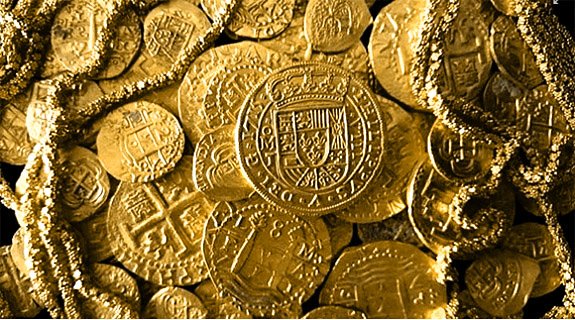Who Owns The Treasures Sunk In The Sea (like the galleon San José) - Steemit
In May 2018 new details emerged about the Spanish galleon San José, sunk off the coast of Colombia by a British ship 300 years ago.

Source
It is said that the ship transported gold, silver and precious stones collected in the colonies of the Spanish empire in South America to deliver them to King Felipe V, who needed funds for the war of Spanish Succession.
Colombia states that it discovered the wreckage somewhere in front of the coasts of the port city of Cartagena, in 2015.
Last year, President Juan Manuel Santos declared that the rescue operation "initiates a new chapter in the cultural and scientific history, not only of Colombia but of the entire world."
Meanwhile, a team of marine archaeologists, with the help of an underwater robot, started an investigation and published new information on what has been discovered so far.
Some people have already speculated that it could be the largest sunken treasure of all time, valued in billions.
San Jose is one of thousands of shipwrecks worldwide and the recovery of historical cargo presents a tempting prospect for archaeologists and treasure hunters.
So, to whom does the shipwreck belong?
There are international agreements whose rules govern parts of the treasure hunting process.
However, the decision of who has the right to keep the valuable contents of the ship tends to be taken between countries under international law, says Robert Mackintosh, a lawyer and archaeologist at the University of Southampton, England.
"It is a very complex scenario, since many states and people may have varied and often rival interests in the wreck, interests that have their origins and different sets of laws," he explained.
For example, the original owner of the vessel has a viable property right. But that right can be replaced by the country that has the claim of the territorial waters where the wrecked ship was discovered.
"On the fly"
"The ocean is the largest museum in the world," says marine archaeologist Peter Campbell.
And treasure hunting in sunken ships is a huge business.
Speculation about the value of the contents of a shipwreck can be triggered even before the items are salvaged.
But, frequently, the operational costs of archaeological research may be greater than the value of the wreck itself, says Campbell.
News reports suggest that the content of San Jose could be worth up to US $ 17,000 million. Although when the Colombian government made the discovery public, in 2015, the estimated value that was reported from the treasury was between US $ 1,000 million and US $ 10,000 million.
The figure of US $ 17,000 million "seems to have been caught on the fly," suggests Campbell.
Even so, experts agree that San José has immense financial and cultural value.
What does the law say?
The UNESCO convention of 2001 on underwater cultural heritage includes rules that help to bring suitable practices for underwater excavations and guides that stipulate what certificates should be of the people involved in the conservation and management of the site.
The UNESCO section that oversees underwater heritage sites said that it would be very excited to play a role in resolving shipwreck claims. However, it indicates that it has not been contacted for this purpose.
A country can claim possession over a shipwreck if, in the first place, it owned the vessel. Although the ship has sunk and been abandoned for hundreds of years, the original owner can still claim possession rights.
There have also been cases in which a country transfers ownership of a vessel to another country for the ship to be displayed in a museum.
However, the question of possession may be complicated by the location of the wreck, if it lies in territorial waters of another state.
According to international law, a country has absolute sovereignty over these waters so that, essentially, it can do what it wants in terms of taking possession, says Mackintosh. There are more legal ramifications if the wreck is in international waters.
When a vessel is discovered, the country where the vessel was registered may give rise to something called sovereign immunity (in addition to possession claims).
This refers to a specific category of vessels that are immune from legal processes in another state. Warships and other government vessels operated for non-commercial purposes enjoy sovereign immunity, Mackintosh assures.
Under the sovereign immunity principle of 2009, a judge in the United States ruled that the court did not have jurisdiction over the case involving the treasure hunt company Odyssey Marine Exploration and the wreck of the Spanish ship Nuestra Senora de las Mercedes.
The US exploration company was forced to deliver half a million gold and silver coins to the government of Spain. Odyssey Marine Exploration had recovered 17 tons of coins off the coast of Gibraltar and had moved them to the US.
Odyssey claimed to have found the wreck in international waters and claimed the ransom rights. Spain argued that it had never renounced possession of the ship's cargo and that the coins were part of the country's national heritage.
The origins of the contents of a vessel can also enter into the dispute. For example, in the case between Odyssey and the Mercedes shipwreck, Peru filed a lawsuit in the US courts. declaring that the origin of the precious cargo was Peru, where the metal was mined and the coins minted, when it was part of the Spanish Empire.